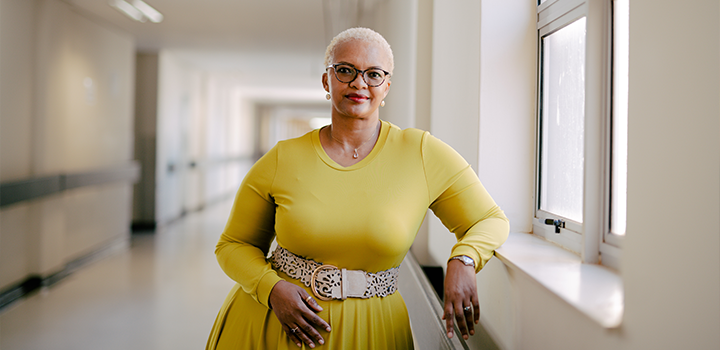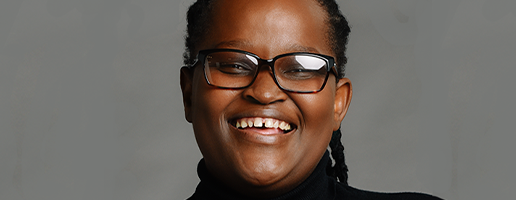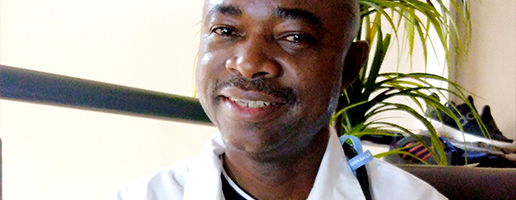Supporting the mental health of young men undergoing ritual circumcision

Traditional initiation rites can sometimes lead to traumatic outcomes for young men. Prof Zukiswa Zingela and her team are finding innovative ways of bringing mental healthcare to communities in far-flung regions of the Eastern Cape.
When circumcisions go wrong, the mental health risk to the initiates can be enormous, especially when it leads to deformities and loss of function.
Mthatha-based psychiatrist Prof Zukiswa Zingela received a Discovery Foundation Rural Institutional Award in 2020 for her team at Nelson Mandela Academic Hospital to help mitigate these risks. They will also train primary healthcare workers to recognise mental health conditions in patients living in rural areas.
She explains why she applied for the award. "In 2019, we faced another worrying statistic of initiates who were losing their lives or who were affected in other traumatic ways by botched circumcisions. A request came through for me and my team to provide psychosocial intervention. Before that, we had received a similar request to intervene after a mass trauma incident that affected health staff in one of our rural hospitals."
"These separate yet related incidents of trauma highlighted the need for us to do all we could to improve our capacity as mental health professionals leading the public mental health service in this province," she says.
The next phase of her extensive training
Prof Zingela was born in Zwide, an informal settlement outside Gqeberha. She chuckles when she says that Springbok captain Siya Kolisi was also born there and now people know where it is.
She studied medicine at the University of KwaZulu-Natal and specialised in psychiatry at the University of Pretoria. She has been a psychiatrist for 17 years and worked for the National Health Service in Lancashire in the United Kingdom for five years. She heads up the Department of Psychiatry and Human Behavioural Sciences at the Nelson Mandela Academic Hospital, affiliated to Walter Sisulu University.
"The placement of these two institutions right in the middle of this rural community makes it the ideal place from which to come up with innovative and targeted ways to solve the major health threats facing our communities - and that includes mental health," Prof Zingela says.
Botched circumcisions and the mental health link
Nelson Mandela Academic Hospital serves 3.2 million people living in the Eastern Cape. The 60-bed mental health unit serves up to 1 600 patients a month. The staff also train medical students and postgraduate doctors specialising in psychiatry.
But when healthcare budgets are under pressure, patients with mental health conditions may not get the care they need - especially during the COVID-19 pandemic.
"There is only so much this small team of people can do. The pressure on the healthcare systems shines a spotlight on the need for innovation to increase our capacity to deliver meaningful and effective healthcare during all these challenges," Prof Zingela says. "As head of this department, I recognised the need to drive mental health training at primary care and district level to address the mental health needs of the people who live in this area."
Their project aims to improve the assessment of initiates' mental health and to provide intervention from a qualified multi-disciplinary team. This will help to mitigate the mental health risks arising from complications of botched circumcisions.
Making mental healthcare a reality in rural areas
"If you cannot recruit more staff, you need to make optimal use of the people that you do have. All healthcare professionals can learn to look for mental health problems in their patients. This needs to be considered a basic skill for any healthcare worker, like the ability to check a pulse or blood pressure," Prof Zingela says.
"We hope to increase our capacity to deliver these services closer to where communities are so that they have better access to health services without putting an undue strain on financial resources to travel far to get help. And that's where the primary healthcare workers come in," she explains.
How will they improve capacity without increasing staff? "It is important that we know our community well. We should know what training to deliver so that the focus is on practical problem-solving for health challenges, with home-grown solutions to meet the community's needs. We can pool our skills and brain power and lean on the staff to come up with innovative and targeted solutions," she says.
"The project offers short training courses to primary care staff on mental health issues and interventions, and that is what sets it apart. Primary care staff are already living and working in the targeted rural areas, they know their communities, and they are now better equipped to identify patients with mental health issues and refer them to us for treatment."
The pandemic: 500 frontline workers trained
The COVID-19 pandemic halted this year's winter initiation ceremonies. But Prof Zingela and her team realised they could still train 500 frontline healthcare workers to deal with the mental health problems anticipated with the outbreak. Plus, healthcare workers can use these skills more widely over time, including for the mental health of initiates.
They are also providing psychosocial support to learners and teachers affected by the pandemic. Again, this will increase skills across all levels of potential referral sources into the mental health service.
"Innovation starts with a passion and dedication to serve. Combined with a willingness to address challenges within our health systems and a dedicated core team of people, even limited resources cannot stop the tide of progress and goodwill that comes from that," Prof Zingela concludes.
This article was created for the 2020 Discovery Foundation Awards and has been edited for the Discovery Magazine.
About the Discovery Foundation
Since 2006, the Discovery Foundation has invested over R256 million in grants to support academic medicine through research, development and training medical specialists in South Africa.
The Discovery Foundation is an independent trust with a clear focus - to strengthen the healthcare system - by making sure that more people have access to specialised healthcare services. Each year, the Discovery Foundation gives five different awards to outstanding individual and institutional awardees in the public healthcare sector.
Related articles

Tackling post-traumatic stress disorder in ICU patients
Being in an intensive care unit and receiving critical care can be a harrowing experience. Psychiatry registrar Dr Sarah Boshoff is investigating how doctors and nurses can help to prevent triggers of post-traumatic stress disorder in patients.

Grandmother inspires a digital approach to caring for the elderly
Dr Sihle Nhlabathi's grandmother scared her as a child. So, she studied geriatrics to understand the mental health of the elderly. Her research seeks to increase knowledge and address the dire need for geriatric psychiatrists in South Africa.

Caring for women when they have an abortion
Who takes care of women after they have had an abortion? Dr Kwakombe Ndjondo's research on women's experiences after voluntary termination of pregnancy at a rural hospital aims to support women and reduce pressure on public healthcare services.